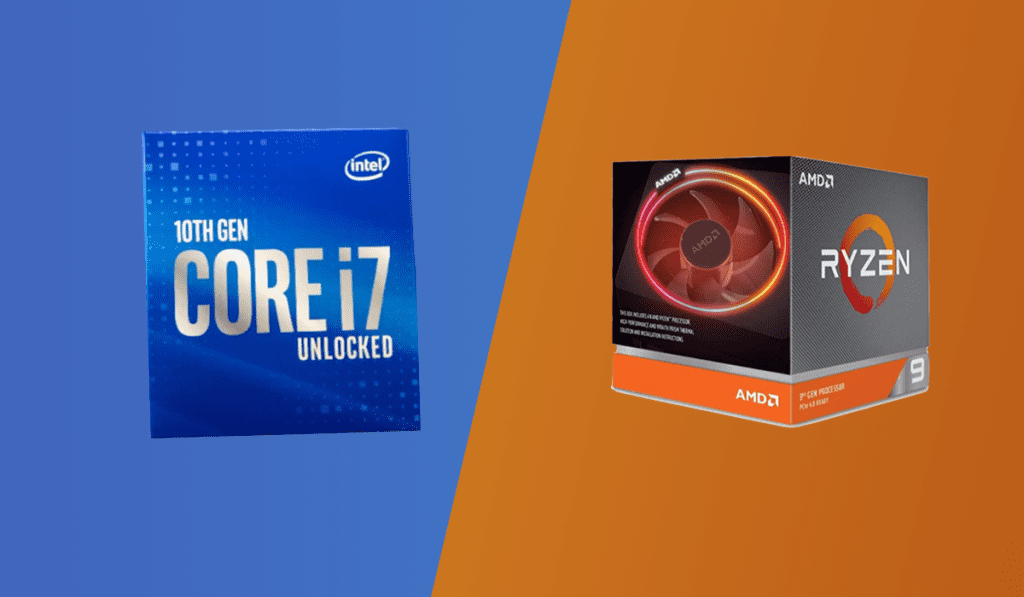AMD and Intel have always been in competition with one another, and the ultimate question of which is best has always been a hot topic of conversation among the PC community.
Most recently, Intel released their i9 10900K processor that directly competes with AMD’s Ryzen 9 3900X.
With the two CPUs boasting similar specs and price points, it can be hard choosing between the two and deciphering which is the best bang for your buck.
Today we’ll be doing just that, by taking a close look at each chip in order to pick the product that’s best worth your money.
Related Post: Ryzen 3700x vs 3800x
Ryzen 9 3900X Vs Intel i9 10900K: Specs
Both AMD and Intel’s processors offer some impressive specs, though they differ in several departments. AMD boasts a 12-core, 24-thread processor with an overclockable max frequency of 4.6 GHz.
Comparatively, Intel’s offering is a 10-core, 20-thread processor but has an overclockable max frequency of 5.3 GHz. So, whilst one processor has more cores and threads, the other has higher overclocking ability.
And though it’s an incredibly minor addition, AMD’s processor also includes an LED CPU cooler, which offers fun RGB lighting and saves the consumer additional cash by eliminating the need to purchase a separate CPU cooler.
It’s small, but an added plus, nonetheless.
Ryzen 9 3900X Vs Intel i9 10900K: Performance
Comparing the processors’ performances is where things really got interesting. While paired with an RTX 2080 Ti graphics card, 32 GB of DDR4 RAM, and an NVMe SSD, we saw how the processors stacked up against one another.
While running Battlefield V on ultra settings at 1080p resolution, the i9 10900K beat out the 3900X, hitting an average of 126 frames per second, while the Ryzen 9 3900X only hit 110 fps on average. When overclocked, Intel’s chip hit 130 fps, with AMD’s reaching 118 fps.
As the game jumped up to a 1440p resolution, the differences between the processors lessened with the 10900K and 3900X hitting an average of 94 fps and 91 fps, respectively.
When overclocked, the differences lessened even further, with each hitting 95 and 93 fps. Running at a 4K resolution saw even more similar performances, with the 10900K hitting an average of 52 fps (53 overclocked) verses 3900X’s 51 fps (53 overclocked).
At 4K resolution, there was only 1 single frame per second in difference, with no difference at all when overclocked.
Other highly demanding games saw similar results, with there generally only being about a 5% increase in performance from the Ryzen 9 3900X to the i9 10900K.
The 10900K’s overclocking capabilities became more obvious when tested on Overwatch, where it went from 253 fps to 266 fps overclocked. The 3900X hit an average of 249 fps and rose to 253 fps while overclocked.
Running at 1440p resolution, the chips were neck-in-neck, with the 10900K hitting 198 (210 overclocked) and 3900X hitting 196 (205 overclocked).
The processors hit nearly identical numbers in 4K, with Intel’s chip hitting an average of 192 fps and 202 fps overclocked, and AMD’s hitting 190 fps, rising to 197 fps when overclocked.
Overall, Intel beats out AMD in performance, but not by a large margin—especially with both CPUs overclocked. It’s also clear that, when running at higher resolutions, the differences between the two becomes negligible, with only 1-2% difference between the two when running most titles.
Results outside of gaming are perhaps even more interesting.
While testing both processors on Cinebench R20, it was found that the Ryzen 9 3900X is quite a bit faster than the Intel i9 10900K, being 15% faster without overclocking, and a whopping 21% faster while overclocked.
When tested in Adobe Premiere Pro, the 3900X out sped the 10900K by 18% with both systems overclocked.
These results are due to the Ryzen 9 3900X’s additional cores and threads, making it hands-down the faster system when handling all functions outside of gaming.
Ryzen 9 3900X Vs Intel i9 10900K: Power Consumption
When it comes to power consumption, Intel’s chip tends to draw more than AMD’s offering. While running games and less intensive apps, the 10900K consumes an average of 95 and 130 watts, while the 3900X runs much lower, usually between 45 and 105 watts.
So, while it has lower clock speeds, the AMD uses less power than Intel. For those who don’t care much about overclocking, the AMD is obviously better in this department.
Ryzen 9 3900X Vs Intel i9 10900K: Price
While both products are similar in many ways, one thing that the AMD Ryzen 9 3900X has above the 10900K is its price.
Being on the market longer than its competitor, the 3900X recently saw a price cut, going from its original $499.99 price down to $429.99, cutting a whopping $70, which is nearly 20% less.
Meanwhile, the Intel i9 10900K has seen no such price cut, and still sits at its price tag of $549.99, $50 more expensive than AMD’s processor pre-price cut.
As it currently stands, Intel’s processor is now $120 more expensive than AMD’s offering, driving quite a hard bargain.
With nothing else on the market anywhere near as expensive as the 10900K, it’s hard to recommend spending so much on it. Until it gets some sort of price cut, Intel’s offering just feels too expensive.
Ryzen 9 3900X Vs Intel i9 10900K: Conclusion
The AMD Ryzen 9 3900X and Intel i9 10900K are both excellent processors, however AMD’s offering is an overall better value. While the 10900K has higher overclocking speeds than the 3900X, the 3900X has additional cores, making it an overall faster processor. For those who only care about the fastest gaming performance, the 10900K is technically better.
But for everything else outside of gaming, the 3900X wins. Additionally, it takes less power, and is considerably less expensive thanks to its recent price cut. Throw in a free CPU cooler fan with RGB lighting capabilities, and the choice is clear.
When making a decision between AMD and Intel, there’s no question here: the Ryzen 9 3900X is the better choice.



